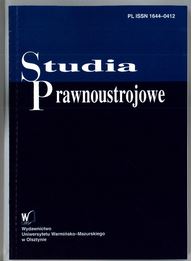Zdalne posiedzenia aresztowe w trybie art. 250 § 3b–3h Kodeksu postępowania karnego. Uwagi de lege lata i de lege ferenda
E-arrest meetings under the terms of art. 250 § 3b–3h of the Code of Criminal Procedure. Postulates de lege lata and de lege ferenda
Author(s): Piotr MisztalSubject(s): Criminal Law, Human Rights and Humanitarian Law, Penal Policy
Published by: Wydawnictwo Uniwersytetu Warmińsko-Mazurskiego w Olsztynie
Keywords: criminal procedural law; criminal trial; e-arrest meetings; the accused’s right to a court; the accused’s right to defence; fair criminal trial;
Summary/Abstract: This article relates to e-meetings based on art. 250 3b–3f of the Code of Criminal Procedure. The above legal regulations appeared in the Polish criminal trial on June 24, 2020. The aim of the article is to present the most important shortcomings of e-detention sessions and to propose changes that will adapt it to the principle of a fair criminal trial. So far, this subject has not been of wider interest to representatives of the science of procedural criminal law. The study presents: the ratio legis of the e-meeting, the conditions of its application, and assesses the e-meeting in the context of the accused’s right to a court and the right to defence. The author took into account the most important judgments of the European Court of Human Rights relating to the possibility of taking procedural actions at a distance with the simultaneous transmission of image and sound. The article presents de lege ferenda postulates addressed to the legislator to improve this institution. The author proposes to create two conditions for the use of e-arrest meetings. First, the emergence of particularly important circumstances in the case. Second, the consent of the accused to conduct a procedural act via teleconference. Currently, the decision in this matter depends on the discretionary power of the court. Such limitations would constitute mechanisms preventing the arbitrariness of the court in the scope of its decision. What is more, an accused who is not present in court does not have unconditional consent to contact a lawyer to establish a line of defence, which also requires an immediate change.
Journal: Studia Prawnoustrojowe
- Issue Year: 2021
- Issue No: 54
- Page Range: 405-421
- Page Count: 18
- Language: Polish

